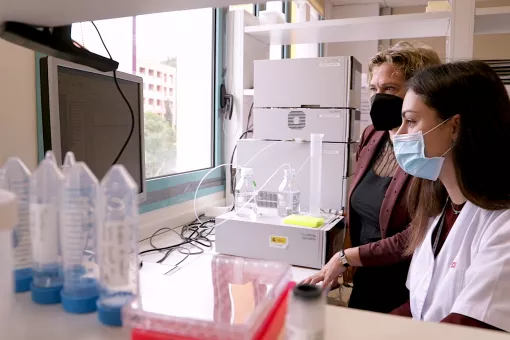The consortium, called NABARSI, will receive 4.1 million euros of funding from the European Commission and is formed by three public research centres and two companies, among these the IRB Barcelona spin-off Omnia Molecular
The inappropriate use of antibiotics and the natural selection process are causing the appearance of bacteria that are resistant to current drugs. This resistance is a threat for the correct treatment of infections, and in the future we may lack therapeutic strategies to combat the bacterial pathogens that attack our bodies. To prevent this scenario, the European Union, through the 7th Framework Programme, has allocated 4.1 million euros to the NABARSI consortium, of which 1.2 million will go to Omnia Molecular. The project, which will start this summer and be conducted over three years, will combine computational methods with chemistry and biology approaches.
The NABARSI consortium is formed by three research groups and two companies, among these the IRB Barcelona spin-off Omnia Molecular, set up in 2005 by ICREA researcher Lluís Ribas de Pouplana, head of the Gene Translation Laboratory. The research will revolve around Omnia Molecular technology and will focus on identifying and evaluating inhibitors of aminoacyl tRNA synthetases, proteins involved in the synthesis of microbial proteins and that are vital for bacteria. Omnia Molecular will be responsible for the biological testing of the molecules selected by bioinformatics approaches. This testing will be possible thanks to “In-Omnia”, a patented technology platform that allows the study of the antimicrobial activity inside a human cell. This method has the advantage that it allows researchers to discard those compounds that are unable to cross cell membranes and that would therefore not be effective, or that, although showing antibacterial activity, would be harmful for human cells.
The consortium is coordinated by the Dutch university Erasmus MC and includes the participation of the University of Leeds (UK), the Latvian Institute of Organic Synthesis and the English company InhibOx Ltd, in addition to Omnia Molecular. The final objective is to bring new drugs onto the market with which to combat bacterial resistance. For this purpose, NABARSI will seek to establish agreements with pharmaceutical companies with the capacity to develop and commercialize the antibiotics that are developed from this project.
About IRB Barcelona
The Institute for Research in Biomedicine (IRB Barcelona) pursues a society free of disease. To this end, it conducts multidisciplinary research of excellence to cure cancer and other diseases linked to ageing. It establishes technology transfer agreements with the pharmaceutical industry and major hospitals to bring research results closer to society, and organises a range of science outreach activities to engage the public in an open dialogue. IRB Barcelona is an international centre that hosts 400 researchers and more than 30 nationalities. Recognised as a Severo Ochoa Centre of Excellence since 2011, IRB Barcelona is a CERCA centre and member of the Barcelona Institute of Science and Technology (BIST).




